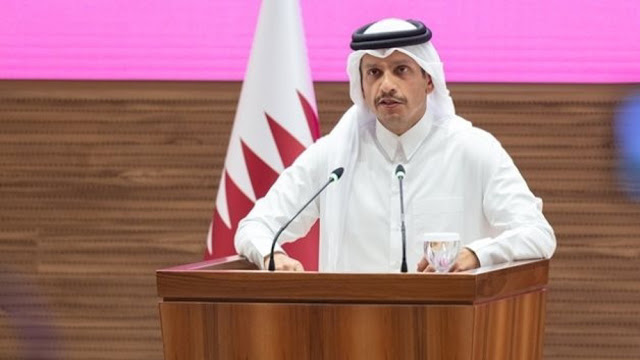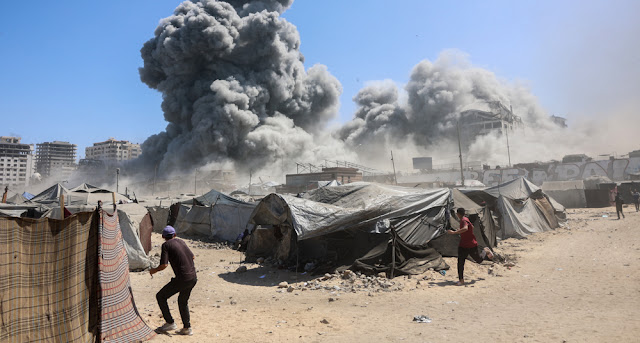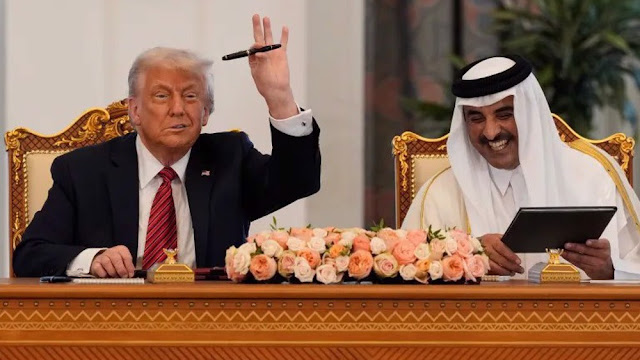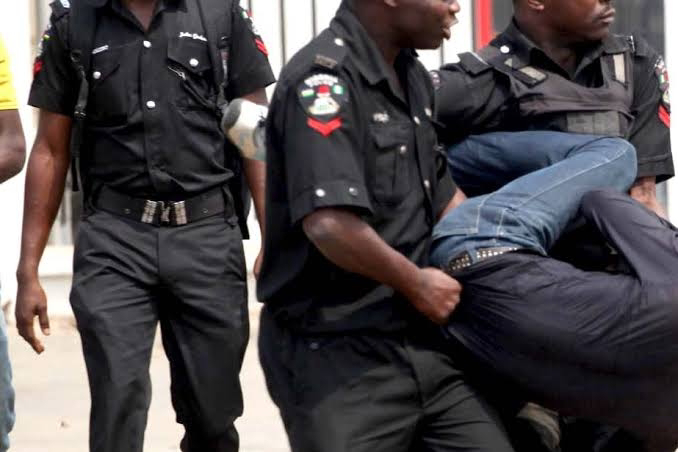In a fiery and resolute response, Qatar’s Prime Minister and Foreign Minister, Sheikh Mohammed bin Abdulrahman Al Thani, delivered a scathing condemnation of Israel’s recent military strike targeting Hamas’s political leadership in Doha, branding the act as nothing short of “state terrorism.” The remarks, made during a press conference on Tuesday night, were echoed and amplified in an official statement issued by Qatar’s Ministry of Foreign Affairs (MFA) on Wednesday, September 10, 2025. The statement not only reinforced the Prime Minister’s strong disapproval but also underscored Qatar’s unwavering commitment to defending its sovereignty, territorial integrity, and regional stability in the face of what it described as Israel’s reckless and provocative actions.
Qatar’s Prime Minister Sheikh Mohammed bin Abdulrahman Al Thani speaks during a press conference after Israeli strikes on Hamas leadership in Doha, September 9, 2025. (Photo by Qatar’s MFA)
The Israeli strike, which targeted senior Hamas political figures residing in Doha, has ignited a firestorm of diplomatic outrage, with Qatar accusing Israel of violating international norms and destabilizing the region. Sheikh Mohammed’s remarks, delivered with palpable indignation, painted a picture of Israel as a “rogue actor” whose actions threaten not only Qatar but the broader Middle East. The Prime Minister’s statements, coupled with the MFA’s official release, signal a deepening rift between Qatar and Israel, with potential ramifications for regional geopolitics, U.S.-mediated diplomacy, and the ongoing Israeli-Palestinian conflict.
Qatar’s Official Stance: A Violation of Sovereignty
The MFA’s statement, released earlier today, provided a detailed summary of Sheikh Mohammed’s press conference, emphasizing Qatar’s categorical rejection of Israel’s actions. “The State of Qatar condemns in the strongest terms Israel’s blatant violation of our sovereignty and international norms,” the statement read. It accused Israel of engaging in “deliberate and provocative acts” that undermine regional security and violate the principles of international law, including respect for the territorial integrity of sovereign nations.
The statement further clarified that Qatar views the strike as an attack not only on its soil but also on the broader framework of diplomatic norms that govern interstate relations. “Such actions are a direct affront to the principles of sovereignty and mutual respect that form the foundation of international order,” the MFA declared. It reiterated Qatar’s commitment to pursuing all available diplomatic and legal avenues to hold Israel accountable for what it described as a “flagrant breach” of international law.
Sheikh Mohammed, in his remarks, was unequivocal in his criticism of Israeli Prime Minister Benjamin Netanyahu, whom he accused of orchestrating the strike as part of a broader pattern of aggressive and destabilizing behavior. “These barbaric actions only reflect the barbarism of this person, who is dragging the region to a place where it unfortunately cannot be repaired,” the Qatari Prime Minister stated, his words dripping with disdain for Netanyahu’s leadership. He argued that the strike was not an isolated incident but part of a deliberate strategy by Israel to assert dominance over the region, regardless of the consequences for neighboring states.
Israel as a “Rogue Actor”
One of the most striking elements of Sheikh Mohammed’s rhetoric was his characterization of Israel as a “rogue actor” engaging in “constant political thuggery.” This language, echoed in the MFA’s statement, reflects Qatar’s growing frustration with Israel’s actions, which it perceives as a direct challenge to the stability of the Middle East. “Israel sends a clear message to the entire region: There is a rogue actor engaging in constant political thuggery in this region and violating the sovereignty of its states,” Sheikh Mohammed said, his voice resonating with a mix of anger and resolve.
This accusation is particularly significant given Qatar’s role as a key diplomatic player in the region. Doha has long positioned itself as a mediator in regional conflicts, including hosting peace talks and facilitating negotiations between Israel and Palestinian factions, such as Hamas. The fact that the strike targeted Hamas’s political leadership in Doha—where the group has maintained a political office with Qatar’s approval—adds a layer of complexity to the situation. Qatar has argued that the presence of Hamas officials in Doha is part of its broader effort to promote dialogue and de-escalation in the Israeli-Palestinian conflict, a role that has been tacitly supported by the United States and other international actors.
By striking Hamas leaders in Doha, Israel has not only violated Qatar’s sovereignty but also undermined its diplomatic efforts, according to Sheikh Mohammed. The Prime Minister suggested that the attack was a deliberate attempt to sabotage Qatar’s mediation role, sending a message to other regional actors that Israel will act unilaterally to achieve its objectives, regardless of the consequences.
Netanyahu’s Vision of a “Greater Israel”
Sheikh Mohammed also took aim at Netanyahu’s broader geopolitical ambitions, specifically referencing the Israeli Prime Minister’s recent statements about a “Greater Israel.” Last month, Netanyahu spoke of his “deep connection” to a vision that includes Israeli control over not only the occupied Palestinian territories but also parts of Egypt, Jordan, Syria, and Lebanon. He described this vision as a “historical and spiritual mission,” a statement that has drawn widespread condemnation from Arab states and raised concerns about Israel’s long-term intentions in the region.
In his press conference, Sheikh Mohammed questioned whether Israel’s strike in Doha was intended as a threat to “reshape” the Arab states of the Persian Gulf region. “Is this reckless action meant to send a message to the Gulf states? Is it part of Netanyahu’s so-called vision to redraw the map of the Middle East?” he asked pointedly. The Prime Minister’s remarks reflect a broader anxiety among Gulf Cooperation Council (GCC) states about Israel’s increasingly assertive posture, particularly in light of its ongoing conflicts with Palestinian groups and its tense relations with Iran and its allies.
The reference to a “Greater Israel” is particularly inflammatory in the Arab world, where it is seen as a revival of expansionist ideologies that threaten the sovereignty of neighboring states. Sheikh Mohammed’s decision to highlight this issue suggests that Qatar is seeking to rally regional and international support against what it perceives as Israel’s aggressive overreach. By framing the strike in Doha as part of a larger pattern of Israeli expansionism, Qatar is positioning itself as a defender of Arab sovereignty and a counterweight to Israel’s influence in the region.
Qatar’s Denial of U.S. Notification
Another significant point raised by Sheikh Mohammed was Qatar’s denial of claims that it had received prior notification from the United States about the Israeli strike. Reports had circulated in some media outlets suggesting that Washington, a close ally of both Israel and Qatar, may have informed Doha of the impending attack as a courtesy. However, the Prime Minister categorically rejected these claims, stating that Qatar was “blindsided” by the strike and had received no warning from any party.
This denial is significant for several reasons. First, it underscores the sense of betrayal felt by Qatar, which has maintained a strategic partnership with the United States, including hosting a major U.S. military base at Al Udeid. The lack of prior notification, if true, could strain Qatar’s relationship with Washington and raise questions about the reliability of U.S. mediation in the region. Second, it reinforces Qatar’s narrative that the strike was a deliberate and unilateral act by Israel, carried out without regard for the diplomatic sensitivities of its allies.
The MFA’s statement echoed this point, noting that Qatar “rejects any suggestion that it was complicit in or aware of Israel’s actions.” The ministry called for a full investigation into the circumstances of the strike and urged the international community to hold Israel accountable for its actions. This demand for accountability reflects Qatar’s broader strategy of leveraging international institutions, such as the United Nations, to challenge Israel’s conduct and seek redress for the violation of its sovereignty.
Regional and International Implications
The Israeli strike on Doha and Qatar’s response have far-reaching implications for the Middle East and beyond. At the regional level, the incident is likely to exacerbate tensions between Israel and the Arab states, particularly those in the Gulf. While some Gulf countries, such as the United Arab Emirates and Bahrain, have normalized relations with Israel through the Abraham Accords, others, including Qatar, have maintained a more cautious stance, prioritizing the Palestinian issue in their foreign policy. The strike in Doha could further polarize the region, with Qatar and other like-minded states doubling down on their criticism of Israel, while pro-Israel Gulf states face pressure to reassess their ties with Jerusalem.
The incident also complicates the broader Israeli-Palestinian conflict. Hamas, which has long relied on Qatar as a safe haven for its political leadership, may now face increased pressure to relocate its operations. However, finding an alternative host country could prove challenging, given the group’s designation as a terrorist organization by many Western countries. Qatar’s role as a mediator in the conflict may also be jeopardized, as the strike has exposed the vulnerabilities of its position as a neutral broker.
Internationally, Qatar’s strong condemnation of Israel is likely to resonate with other nations critical of Israel’s actions, particularly in the Global South. Countries such as Turkey, Iran, and Malaysia, which have been vocal in their support for the Palestinian cause, may seize on the incident to amplify their criticism of Israel and call for stronger international action. At the same time, the United States and its Western allies will face a delicate balancing act, as they seek to maintain their strategic partnerships with both Israel and Qatar while avoiding being drawn into a broader regional conflict.
Qatar’s Commitment to Sovereignty and Stability
Throughout his press conference and in the MFA’s statement, Sheikh Mohammed emphasized Qatar’s unwavering commitment to defending its sovereignty and promoting regional stability. “The State of Qatar will not tolerate any violation of its sovereignty, territorial integrity, or security,” he declared, signaling that Doha is prepared to take a firm stand against any further provocations. This stance reflects Qatar’s broader foreign policy, which seeks to position the country as a responsible and influential actor on the global stage.
Qatar’s response to the strike also highlights its determination to protect its role as a mediator and diplomatic hub. Despite the challenges posed by the attack, Sheikh Mohammed reaffirmed Qatar’s commitment to fostering dialogue and de-escalation in the region. “We will not be deterred from our mission to promote peace and stability,” he said, adding that Qatar would continue to engage with all parties to the Israeli-Palestinian conflict, including Hamas, in pursuit of a just and lasting resolution.
The MFA’s statement concluded with a call for the international community to uphold the principles of sovereignty and non-interference, urging all nations to condemn Israel’s actions and work together to prevent further escalation. “The international community must send a clear message that such acts of aggression will not be tolerated,” the statement read. “Qatar remains steadfast in its commitment to peace, justice, and the rule of law, and we will continue to stand up for our rights and the rights of all nations.”
Conclusion
Qatar’s forceful condemnation of Israel’s strike on Hamas’s political leadership in Doha marks a significant escalation in the ongoing tensions between the two nations. By labeling the attack as “state terrorism” and accusing Israel of violating international norms, Qatar has positioned itself as a vocal critic of Israel’s actions and a defender of Arab sovereignty. The incident has also raised questions about the future of Qatar’s role as a mediator in the Israeli-Palestinian conflict, as well as its relationship with the United States and other international actors.
As the situation continues to unfold, the international community will be closely watching Qatar’s next steps and Israel’s response. For now, Sheikh Mohammed’s remarks and the MFA’s statement reflect a deep sense of outrage and determination, signaling that Qatar will not back down in the face of what it perceives as a direct assault on its sovereignty and regional stability. The strike in Doha may prove to be a turning point in the Middle East, with the potential to reshape alliances, inflame tensions, and challenge the delicate balance of power in the region.






